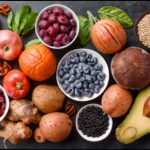The growing trend towards plant-based diets has highlighted a critical aspect of nutrition: not just what you eat, but also how your body absorbs nutrients. This absorption is known as “bioavailability.” Although plant-based foods are rich in essential nutrients, the body doesn’t always fully absorb these elements, posing a challenge. So, how can we make plant-based foods healthier through enhanced nutrient bioavailability? Let’s delve into the mechanisms and practical methods to achieve this.
Understanding Plant-Based Diets
Why Choose Plant-Based?
A plant-based diet, rich in fruits, vegetables, legumes, nuts, and grains, often presents a powerhouse of nutrients essential for optimal health. These foods, inherently low in saturated fats and free from cholesterol, contribute to a lower calorie intake and a reduced risk of chronic diseases such as diabetes and high blood pressure. The fiber content aids digestion, while the abundant antioxidants and phytochemicals combat oxidative stress, promoting overall wellbeing.
Nutrient Bioavailability Challenges
However, there’s a catch: the nutrients in plant-based foods aren’t always fully absorbed by our bodies. This dilemma is primarily due to compounds called “antinutrients,” naturally present in these foods, which can inhibit the absorption of essential minerals and vitamins, potentially leading to deficiencies.
Enhancing Nutrient Absorption
The Issue with Antinutrients
Role of Phytic Acid
Among the antinutrients, phytic acid deserves particular attention. Found in grains, nuts, seeds, and legumes, it binds minerals like calcium, iron, magnesium, and zinc, reducing their bioavailability. High amounts of phytic acid can lead to mineral deficiencies and digestive issues, negating some benefits of a plant-based diet.
Methods to Increase Nutrient Bioavailability
Soaking
One traditional method to reduce antinutrients and enhance nutrient absorption is soaking nuts, seeds, grains, and legumes. This process initiates enzymatic reactions, reducing phytic acid levels and unlocking beneficial nutrients, making them more accessible for absorption.
Fermenting and Sprouting
Fermentation and sprouting present another solution. These methods not only decrease antinutrient levels but can also increase the nutrient content. By encouraging the growth of beneficial bacteria, they can improve gut health, further assisting in nutrient absorption.
Cooking Methods
The way we cook our foods also plays a pivotal role in nutrient bioavailability. While raw foods maintain their vitamin C content, cooking enhances the digestibility and absorption of other nutrients and antioxidants, such as carotenoids and ferulic acid.
The Dos And Don’ts Of Whole Food Plant-Based Eating
Balancing Raw and Cooked Foods
Striking the right balance between raw and cooked foods can ensure you get the best of both worlds. Raw foods preserve sensitive vitamins, while cooking releases other nutrients and neutralizes certain antinutrients like oxalic acid, which hinders calcium absorption.
Boosting Mineral Absorption with Vitamin C
Practical Tips
Incorporating vitamin C-rich foods into meals can significantly enhance the absorption of minerals like iron. This tactic is especially useful in a plant-based diet, where iron primarily comes in a form less easily absorbed. Simple practices like adding a squeeze of lemon to your salads or including fresh herbs can make a substantial difference.
Adopting a plant-based diet is undoubtedly beneficial for health, but understanding and applying methods to enhance nutrient bioavailability is crucial. Through soaking, sprouting, fermenting, balancing cooking methods, and cleverly incorporating vitamin C, we can dramatically improve the nutritional quality of our plant-based meals, ensuring a healthier, more nourishing diet.
FAQs
Can cooking destroy beneficial nutrients in plant-based foods?
While cooking can diminish certain vitamins, such as vitamin C, it can also enhance the bioavailability of other nutrients and antioxidants. The key is a balanced approach between cooked and raw foods.
What are antinutrients, and are they harmful?
Antinutrients are compounds in foods that can interfere with nutrient absorption. They’re not inherently harmful and often have health benefits, but their effects on mineral absorption should be considered in plant-based diets.
How does vitamin C enhance mineral absorption?
Vitamin C, particularly from fresh fruits and vegetables, can enhance the absorption of minerals like iron, especially important in plant-based diets where iron is less bioavailable.
Are soaked or sprouted grains healthier?
Soaking and sprouting grains reduce antinutrient levels, making the nutrients more bioavailable. They may also provide additional health benefits due to increased nutrient levels and improved digestibility.
Is it necessary to eliminate all antinutrients from a plant-based diet?
Not necessarily. While reducing antinutrients can improve nutrient absorption, some also offer health benefits. The objective is to strike a balance for optimal health.







